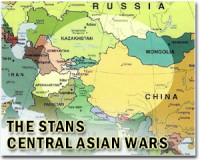| . |  |
. |
West Point Military Academy, New York (AFP) Feb 25, 2011 Defense Secretary Robert Gates warned Friday against committing the US military to big land wars in Asia or the Middle East, saying anyone proposing otherwise "should have his head examined." Gates offered the blunt advice -- hard won after a decade of bitter conflicts in Afghanistan and Iraq -- in what he said would be his last speech to cadets at the US Army's premier school for training future officers. "The odds of repeating another Afghanistan or Iraq -- invading, pacifying, and administering a large third world country -- may be low," Gates said. "In my opinion, any future defense secretary who advises the president to again send a big American land army into Asia or into the Middle East or Africa should 'have his head examined,' as General MacArthur so delicately put it," Gates said. Douglas MacArthur, the World War II hero of the Pacific campaign, made the comment at a meeting with then-president John F. Kennedy in 1961 regarding US military intervention in mainland Asia. Gates, a former CIA director, replaced Donald Rumsfeld in the defense job in 2006 as Iraq was spiraling into civil war and the US military appeared to be facing a historic failure. The change in leadership and a new strategy executed by General David Petraeus helped salvage the situation, and US forces now appear on schedule to leave the country at the end of this year. But nearly 100,000 US troops are still deeply engaged in another difficult conflict in Afghanistan, once again under Petraeus' command, with no exit seen before 2014. Gates said he was not suggesting that the US army "will -- or should -- turn into a Victorian nation-building constabulary designed to chase guerrillas, build schools, or sip tea. "But as the prospects for another head-on clash of large mechanized land armies seem less likely, the Army will be increasingly challenged to justify the number, size, and cost of its heavy formations," he said. Future US military interventions abroad will likely take the form of "swift-moving expeditionary forces, be they Army or Marines, airborne infantry or special operations," which Gates said "is self-evident given the likelihood of counterterrorism, rapid reaction, disaster response, or stability or security force assistance missions." Gates is set to leave his job this year, and his presentation was a farewell speech to the West Point students. "We can't know with absolute certainty what the future of warfare will hold," Gates said, "but we do know it will be exceedingly complex, unpredictable, and -- as they say in the staff colleges -- unstructured." The United States also has a poor track record at predicting the next conflict, Gates said. "We have never once gotten it right, from the Mayaguez to Grenada, Panama, Somalia, the Balkans, Haiti, Kuwait, Iraq, and more -- we had no idea a year before any of these missions that we would be so engaged," he said. Gates praised the army's "ability to learn and adapt," which in recent years "allowed us to pull Iraq back from the brink of chaos in 2007 and, over the past year, to roll back the Taliban from their strongholds in Afghanistan."
Share This Article With Planet Earth
Related Links News From Across The Stans
 US military pulls out of key eastern Afghan valley
US military pulls out of key eastern Afghan valleyWashington (AFP) Feb 25, 2011 The US military has begun pulling soldiers out of the Pech valley in eastern Afghanistan, a location once said to be vital to the war effort in the region, the Pentagon said Friday. The commander of US-led forces in eastern Afghanistan, Major General John Campbell, is "repositioning" forces "within the province to achieve greater effect and allow for more flexibility," said Lieutenant Colone ... read more |
|
| The content herein, unless otherwise known to be public domain, are Copyright 1995-2010 - SpaceDaily. AFP and UPI Wire Stories are copyright Agence France-Presse and United Press International. ESA Portal Reports are copyright European Space Agency. All NASA sourced material is public domain. Additional copyrights may apply in whole or part to other bona fide parties. Advertising does not imply endorsement,agreement or approval of any opinions, statements or information provided by SpaceDaily on any Web page published or hosted by SpaceDaily. Privacy Statement |